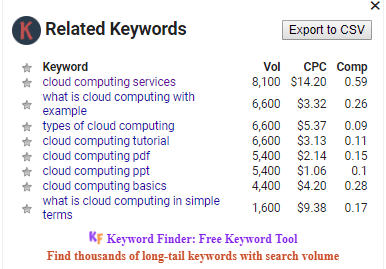Competition is what drives the market. It’s also what drives your prospective customers (and their budgets) to other companies.
We’re all up for a little healthy competition, right? That’s not so much the case in the online marketplace. When it comes to gaining customers, if your direct competitors are getting sales, it’s at your expense.
So how do you funnel more leads and sales into your own pipeline? Easy – the simple answer is more visibility over your competitors. The complexities lie in how to obtain more visibility. We’re going to deconstruct some of the top ways you can outrank your competitors on Google in the SERPs and more effectively gain organic visibility so that your website can come out on top.
Keyword Research
Keyword research is market research.
Keyword research is incredibly important because it impacts every SEO task that follows. Effective keyword research outlines your strategy for on-page SEO, content creation, and most importantly, helps you better understand your audience and their intent.
Target the entire buying cycle in your keyword strategy
When a person is in the process of making a purchase, the searches begin very broad in the research phase and become more specific as that person gets closer to making a purchase. With SEO, you can (and should) target users at all points in the buying cycle.
Don’t overlook long-tail terms
Many companies get hung up on the top funnel terms. Big, broad, high volume terms that are sure to bring in tons of sales leads and sales, right? The truth is, broad terms are extremely competitive, and can also bring with them a lot of unqualified traffic. Long-tail keywords (~3+ word searches) generally have lower search volume and are less competitive but represent users who are near the end of the buying cycle. This is also a space where you can more easily outrank competition on Google and earn more qualified traffic at the same time.
Competitor Analysis
Keep the same mindset when trying to outrank your competitors on Google by identifying areas where you can gain quick wins.
If you’re competing in an established industry, competition can be fierce. Oftentimes, the SERPs are saturated with existing companies and the top positions are monopolized by industry giants.
If you copy everything an industry giant is doing on their website, down to keyword strategy and metadata, you won’t just assume their authority and rankings. Instead, you may be missing out on opportunities to home in on more specific keyword themes that could result in more qualified traffic.
Define your competitors
Create and maintain a list of competitors to monitor. This will help you narrow your focus when developing a responsive strategy.

You might be surprised to find that you have a different set of competitors online. When identifying your direct online competitors, look for the websites that rank on page one of the SERPs for the keywords you are specifically targeting.
See what works for them
Let’s start with competitors within your niche. You’ve identified a website that is ranking for keywords that are relevant and attainable for your website.
What should you do?
- Start by looking at their metadata and headline strategies.
- Learn from what they are doing well.
Perhaps they are benefiting from a playful tone in their meta descriptions with interesting CTAs. Or maybe they use a lot of technical jargon that resonates with their target audience.
If they are within your niche, and outranking you in the SERPs, you may want to consider a similar strategy. Bookmark their website so you can come back to it and continually analyze their optimizations and content.
Let’s say your competitor is outranking you for a keyword you are targeting on one of your main pages. Create more content and web pages that directly relate to that keyword and relevant derivatives.
Here is an easy way to see how many pages reference a specific keyword you are targeting.

Using this command shows us how many pages under this domain reference cloud computing. According to this data, Amazon will be hard to beat for this keyword. But test your competitor’s website with your keywords to see where you need to focus your content strategy.
Breaking it down with Breaking Bad
Here’s an example: if your competitor outranks you for “Breaking Bad,” you should create more content around that theme. “Breaking Bad”, “Breaking Bad AMC”, and “Breaking Bad Finale” are all obvious keywords to build on within your theme.
Google has an unlimited amount of user search data and can recognize trends in search behavior. So, Google understands that “Breaking Bad” searchers want to see content involving “Jesse Pinkman,” “Los Pollos Hermanos,” and “Bryan Cranston.”
If you want to rank for “Breaking Bad,” you should have quality content related to each of those keywords with a clean internal linking structure. Google will index these pages and determine that “this website has more ‘Breaking Bad’ authority than the competitor with just one ‘Breaking Bad’ page.”
Okay, so how does this apply to your business?
Say your competitor outranks you for “Cloud Computing.”
Find some relevant derivatives with search volume and build out content around those keywords. There are countless websites and extensions that provide keyword ideas. For example, this Chrome extension allows you to instantly see derivatives in the SERPs when you search.


Continue to utilize this strategy as your competitors build out their content.
Write blogs titled “Advantages of Cloud Computing” and “Different Types of Cloud Computing Software.”
Create a tutorial post titled, “How to Use Amazon Web Services,” or an info-graphic that compares “Microsoft Azure Capabilities vs. Amazon Web Services.”
Link these pieces back to your main Cloud Computing page and see how they perform.
Leverage searcher intent to outdo your competitors
If your tutorial video is a hit, create more tutorials. If your info-graphic gets 50 re-shares on social, create more info-graphics.
Let’s say your competitor wrote an article on “Cloud Computing in Healthcare” which performs well in the SERPs. If info-graphics are your bread and butter, create a “Cloud Computing in Healthcare” info-graphic.
Maybe you see an opportunity to expand on a subtopic on which they only scratched the surface. Write an article that dives deep into the “Specific Use Cases of Cloud Computing in Hospitals”. Outrank your competitors by having a better understanding of your audience and catering to their intent.
Technical SEO
Technical SEO can make or break the effectiveness of your website. From the SERP to the site, your website needs to provide a seamless experience that makes it easy for search engines and users to comprehend your content.
Are your images properly optimized within your CMS? Check out our guide to SEO Image Optimization.
Is your content easily outlined through proper use of headings and header tags? Read up on SEO Header Tag Best Practices.
Does your site load quickly? Is it easy for users to find the pages they are looking for? Here, we outline important Website Tips for SEO Success.
Are you regularly publishing quality content that is written with SEO in mind? Read up on writing On-Page Content for SEO.
Ready to start climbing the ranks? Key takeaways to keep in mind are 1) tap into the wants and needs of your target audience through keyword research 2) honestly evaluate your site against your direct online competition, and 3) find the opportunities that will provide quick wins while you work to establish your overall authority.
Craving more SEO tips? Subscribe to our newsletter for fresh insights.


